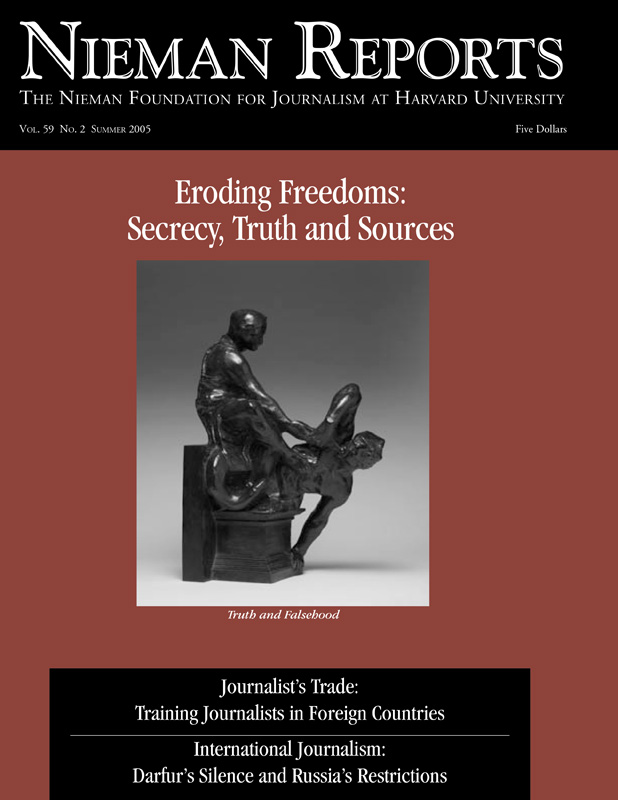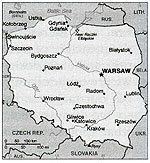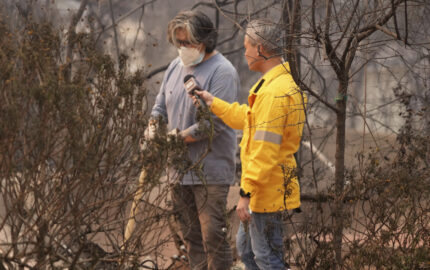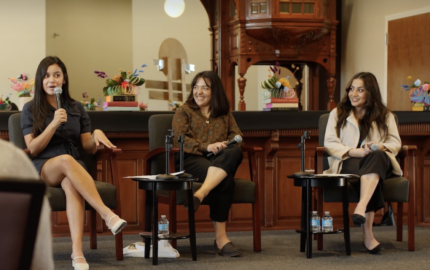
Eroding Freedoms: Secrecy, Truth and Sources
Among the casualties of the invasion and occupation of Iraq have been truth and trust, according to Sig Christenson, military affairs writer for the San Antonio Express-News. After working as both an embedded and independent reporter in Iraq, he writes about the “propaganda war within Gulf War II,” explaining that “Its roots are in Ground Zero, and I have been a willing participant. So, too, were many other reporters.”
When the Poynter Institute asked me in 2004 to travel to Poland to help teach investigative reporting to journalists as part of the International Media Festival in Wroclaw, the significance of the trip immediately crystalized in my mind: good cheap vodka for a whole week.
Once in Poland, however, my cavalier attitude was deflated by one of the first questions directed at me by an earnest young reporter.
“Do you pay your sources?” he asked.
Having served as The Boston Globe’s European correspondent, I had been to Poland before, and I knew a bit about Polish history. But I knew little about the tradition of Polish journalism. Still, I reassured myself: It ain’t rocket science, it’s journalism.
In preparation for the trip, I read about a Polish newspaper reporter, Wojciech Sumlinski, who was risking imprisonment for refusing to name his source for a story that linked mobsters to politicians. On the day we flew into Warsaw, the front page of one newspaper showed the bullet-riddled body of Waldemar Milewicz, one of Poland’s most famous television journalists, after he had been killed in Iraq. Shortly after our arrival in Wroclaw, Maciej Wierzyñski, the editor of Nowy Dziennik, a New York-based daily Polish newspaper, introduced me to his old friend, Jerzy Jachowicz, a courageous muckraker whose home had been firebombed by criminals angry over one of his newspaper exposés.
These were familiar, if differently disturbing, reminders of the seriousness of our business, of a common purpose and common bond. And then the Polish kid threw me for a loop with that question about paying sources.
Sharing Reporting Stories
Working as a foreign correspondent, and especially while covering war in the former Yugoslavia, I had met journalists from all over the world and had convinced myself that, language and cultural idiosyncrasies aside, we’re basically all the same. But who was I to tell journalists how to do their jobs in a country and a culture I knew little about? I was being asked to teach not neophytes, like the students I’d taught at the Harvard Summer School as part of an idealistic but ultimately futile attempt to prolong my Nieman year, but working journalists with well-honed bullshit meters. I felt like James Stockdale, the befuddled, retired admiral who served as presidential candidate Ross Perot’s doomed running mate, whose 15 minutes consisted mostly of asking: “Who am I? What am I doing here?”
The workshop’s leader, Bill Mitchell, a former foreign correspondent who has trained all sorts of journalists in all kinds of settings for the Poynter Institute, advised me to be myself. “Tell them how you do your work,” he’d said. “How you cultivate sources. How you structure a story so that something complex is compelling.” All of this sounded perfectly reasonable. But I wondered how my war stories about kissing up to the cops so they’d give me gangsters’ rap sheets or regaling nuns with tales of my years as a dutiful altar boy at Sacred Hearts Church in Malden, Massachusetts, so they’d feed me information about miscreant priests, would resonate with Polish journalists.
The night before the workshop began, I met with Anna Marszalek, a reporter at the newspaper Rzeczpospolita, who is one of Poland’s most accomplished investigative reporters. Over some Chopin—the vodka, not the composer—she explained some of the difficulties facing Polish journalists, not yet a generation after the iron curtain collapsed. Reporters weren’t paid well, nor widely respected in a society where the cultural hangover from Communism led many people to view journalists as propagandists. More troubling, she said, there wasn’t a tradition of independence: Journalists and news organizations were often openly associated with partisan politics. Some journalists who were willing to skewer certain politicians or power brokers turn a blind eye to the misdeeds of their ideological soul mates or sources, who were sometimes one and the same.
The Poles, once invaded and occupied by Germany, long dominated by the Soviet Union, were still getting their democratic, free-market feet under them, gradually learning the importance of robust, independent news media as Poland was taking its rightful place in the league of free nations. As we sat in a brightly lit bar in Wroclaw, a quaint city of 700,000 in Lower Silesia that sits on 12 islands connected by 112 bridges over the Odra River, Marszalek’s remarks were interpreted for me by a pair of college students from Krakow who looked up to her, as I imagined a pair of American journalism students would have admired Bob Woodward and Carl Bernstein some 30 years ago.
“She’s great,” Karl Badohal, one of the students, said to me of Marszalek. “She’s not afraid of anybody. She’s got balls.”
Marszalek took no offense at her journalistic credentials being measured in this way, smiling broadly when Badohal gave her the Polish translation of his compliment.
Discussing Ethical Issues
The next day, at the workshop, I told some two dozen Polish journalists that investigative reporters are like cops: No matter how smart or streetwise we think we are or how many incriminating documents we dig up, often we are only as good as our sources, who can point us in the direction of important information and help us put it into context. I told them that we thrive on tips from dime-droppers, but how we must be conscious of the motives of those who drop those dimes. I also explained how my Boston Globe colleagues and I depended on receiving tips from ordinary readers as we expanded our coverage of the sexual abuse of children by priests from reporting on individual crimes to exposing an institutional cover up, from a hometown scandal to an international crisis for the Roman Catholic church.
To this, the Polish reporters replied that they don’t get tips like that. “Nobody calls us,” they said. They also let me know that in Poland libel laws favor public figures, not the press. They reminded me, too, that reporters don’t have the public records laws, including the Freedom of Information Act, as we do in the United States.
These issues then became the core of what we talked about. Absent a tradition that values public records’ access and laws that recognize the importance of a free press to a free society, what can journalists, such as these in Poland, do to persuade whistleblowers and other sources to come forward? And how can those who receive the news come to believe that journalists are independent of the powers that be?
To help us explore these questions, we compiled a list of what Polish journalists could do to earn more trust and credibility. When I asked the reporters which of them identified strongly with or belonged to one political party, many raised their hands. I was stunned to learn that about 10 working journalists in Poland were declared candidates for the European Parliament. After some debate, we agreed that journalists shouldn’t run for office or be actively involved in partisan politics, but we could not reach a consensus on whether those who leave journalism to work as spokespeople for politicians or government agencies should be allowed to return to work as reporters.
Some of the journalists explained that they were so poorly paid that they had to have the option of government employment, even as they dabbled in journalism, even though these dual roles might affect the public’s perception about the separation between the state and the press. I’d entered this discussion as a fundamentalist, believing that once a reporter crossed over to work in government, especially for a politician, that journalist forfeited his/her right to return to mainstream journalism as a reporter. After listening to the real-life stories of real-life Polish journalists, I wasn’t so dogmatic or judgmental.
“Can’t I be just as honest and honorable as you?” asked one reporter who had worked as a government press official.
“Touché,” I replied, as the interpreter looked at me with incomprehension. Apparently there is no easy Polish translation for a French word that has become an English idiom.
When a reporter told me about some journalism awards that were handed out by Polish parliamentarians, who decide which reporters cover them best, and police, who do the same, I shook my head as a group of us retired to a bar to debate the merits of such arrangements. Both sides heard each other’s argument, but some of the Poles were not prepared to accept that a bunch of high-falutin’ American journalists who ensconce themselves in a New York hotel on a winter weekend every year to judge the work of their peers were any less susceptible to bias than Polish cops and pols.
In the end, for me, the alleged teacher, and for them, the purported students, what we’d experienced in talking about what we do was something akin to what it is we do every day, or at least what we should do: listen and learn. And the best teachers I’ve had share a trait with the best reporters I’ve met: They are smart enough to accept that they aren’t so smart that they can’t learn something new and, once they do, they can’t wait to tell someone else.
Kevin Cullen, a 2003 Nieman Fellow, is a reporter at The Boston Globe and was a member of the Globe’s investigative team that won the 2003 Pulitzer Prize for Public Service for coverage of the sexual abuse of children by Roman Catholic priests.
Once in Poland, however, my cavalier attitude was deflated by one of the first questions directed at me by an earnest young reporter.
“Do you pay your sources?” he asked.
Having served as The Boston Globe’s European correspondent, I had been to Poland before, and I knew a bit about Polish history. But I knew little about the tradition of Polish journalism. Still, I reassured myself: It ain’t rocket science, it’s journalism.
In preparation for the trip, I read about a Polish newspaper reporter, Wojciech Sumlinski, who was risking imprisonment for refusing to name his source for a story that linked mobsters to politicians. On the day we flew into Warsaw, the front page of one newspaper showed the bullet-riddled body of Waldemar Milewicz, one of Poland’s most famous television journalists, after he had been killed in Iraq. Shortly after our arrival in Wroclaw, Maciej Wierzyñski, the editor of Nowy Dziennik, a New York-based daily Polish newspaper, introduced me to his old friend, Jerzy Jachowicz, a courageous muckraker whose home had been firebombed by criminals angry over one of his newspaper exposés.
These were familiar, if differently disturbing, reminders of the seriousness of our business, of a common purpose and common bond. And then the Polish kid threw me for a loop with that question about paying sources.
Sharing Reporting Stories
Working as a foreign correspondent, and especially while covering war in the former Yugoslavia, I had met journalists from all over the world and had convinced myself that, language and cultural idiosyncrasies aside, we’re basically all the same. But who was I to tell journalists how to do their jobs in a country and a culture I knew little about? I was being asked to teach not neophytes, like the students I’d taught at the Harvard Summer School as part of an idealistic but ultimately futile attempt to prolong my Nieman year, but working journalists with well-honed bullshit meters. I felt like James Stockdale, the befuddled, retired admiral who served as presidential candidate Ross Perot’s doomed running mate, whose 15 minutes consisted mostly of asking: “Who am I? What am I doing here?”
The workshop’s leader, Bill Mitchell, a former foreign correspondent who has trained all sorts of journalists in all kinds of settings for the Poynter Institute, advised me to be myself. “Tell them how you do your work,” he’d said. “How you cultivate sources. How you structure a story so that something complex is compelling.” All of this sounded perfectly reasonable. But I wondered how my war stories about kissing up to the cops so they’d give me gangsters’ rap sheets or regaling nuns with tales of my years as a dutiful altar boy at Sacred Hearts Church in Malden, Massachusetts, so they’d feed me information about miscreant priests, would resonate with Polish journalists.
The night before the workshop began, I met with Anna Marszalek, a reporter at the newspaper Rzeczpospolita, who is one of Poland’s most accomplished investigative reporters. Over some Chopin—the vodka, not the composer—she explained some of the difficulties facing Polish journalists, not yet a generation after the iron curtain collapsed. Reporters weren’t paid well, nor widely respected in a society where the cultural hangover from Communism led many people to view journalists as propagandists. More troubling, she said, there wasn’t a tradition of independence: Journalists and news organizations were often openly associated with partisan politics. Some journalists who were willing to skewer certain politicians or power brokers turn a blind eye to the misdeeds of their ideological soul mates or sources, who were sometimes one and the same.
The Poles, once invaded and occupied by Germany, long dominated by the Soviet Union, were still getting their democratic, free-market feet under them, gradually learning the importance of robust, independent news media as Poland was taking its rightful place in the league of free nations. As we sat in a brightly lit bar in Wroclaw, a quaint city of 700,000 in Lower Silesia that sits on 12 islands connected by 112 bridges over the Odra River, Marszalek’s remarks were interpreted for me by a pair of college students from Krakow who looked up to her, as I imagined a pair of American journalism students would have admired Bob Woodward and Carl Bernstein some 30 years ago.
“She’s great,” Karl Badohal, one of the students, said to me of Marszalek. “She’s not afraid of anybody. She’s got balls.”
Marszalek took no offense at her journalistic credentials being measured in this way, smiling broadly when Badohal gave her the Polish translation of his compliment.
Discussing Ethical Issues
The next day, at the workshop, I told some two dozen Polish journalists that investigative reporters are like cops: No matter how smart or streetwise we think we are or how many incriminating documents we dig up, often we are only as good as our sources, who can point us in the direction of important information and help us put it into context. I told them that we thrive on tips from dime-droppers, but how we must be conscious of the motives of those who drop those dimes. I also explained how my Boston Globe colleagues and I depended on receiving tips from ordinary readers as we expanded our coverage of the sexual abuse of children by priests from reporting on individual crimes to exposing an institutional cover up, from a hometown scandal to an international crisis for the Roman Catholic church.
To this, the Polish reporters replied that they don’t get tips like that. “Nobody calls us,” they said. They also let me know that in Poland libel laws favor public figures, not the press. They reminded me, too, that reporters don’t have the public records laws, including the Freedom of Information Act, as we do in the United States.
These issues then became the core of what we talked about. Absent a tradition that values public records’ access and laws that recognize the importance of a free press to a free society, what can journalists, such as these in Poland, do to persuade whistleblowers and other sources to come forward? And how can those who receive the news come to believe that journalists are independent of the powers that be?
To help us explore these questions, we compiled a list of what Polish journalists could do to earn more trust and credibility. When I asked the reporters which of them identified strongly with or belonged to one political party, many raised their hands. I was stunned to learn that about 10 working journalists in Poland were declared candidates for the European Parliament. After some debate, we agreed that journalists shouldn’t run for office or be actively involved in partisan politics, but we could not reach a consensus on whether those who leave journalism to work as spokespeople for politicians or government agencies should be allowed to return to work as reporters.
Some of the journalists explained that they were so poorly paid that they had to have the option of government employment, even as they dabbled in journalism, even though these dual roles might affect the public’s perception about the separation between the state and the press. I’d entered this discussion as a fundamentalist, believing that once a reporter crossed over to work in government, especially for a politician, that journalist forfeited his/her right to return to mainstream journalism as a reporter. After listening to the real-life stories of real-life Polish journalists, I wasn’t so dogmatic or judgmental.
“Can’t I be just as honest and honorable as you?” asked one reporter who had worked as a government press official.
“Touché,” I replied, as the interpreter looked at me with incomprehension. Apparently there is no easy Polish translation for a French word that has become an English idiom.
When a reporter told me about some journalism awards that were handed out by Polish parliamentarians, who decide which reporters cover them best, and police, who do the same, I shook my head as a group of us retired to a bar to debate the merits of such arrangements. Both sides heard each other’s argument, but some of the Poles were not prepared to accept that a bunch of high-falutin’ American journalists who ensconce themselves in a New York hotel on a winter weekend every year to judge the work of their peers were any less susceptible to bias than Polish cops and pols.
In the end, for me, the alleged teacher, and for them, the purported students, what we’d experienced in talking about what we do was something akin to what it is we do every day, or at least what we should do: listen and learn. And the best teachers I’ve had share a trait with the best reporters I’ve met: They are smart enough to accept that they aren’t so smart that they can’t learn something new and, once they do, they can’t wait to tell someone else.
Kevin Cullen, a 2003 Nieman Fellow, is a reporter at The Boston Globe and was a member of the Globe’s investigative team that won the 2003 Pulitzer Prize for Public Service for coverage of the sexual abuse of children by Roman Catholic priests.



